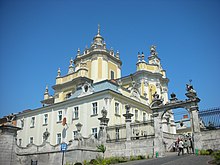St. George's Cathedral, Lviv
| St. George's Cathedral | |
|---|---|

|
|
| Denomination | Ukrainian Greek Catholic |
| Architecture | |
| Status | Cathedral |
| Architect(s) | Bernard Meretyn |
| Style | baroque-rococo |
| Groundbreaking | 1744 |
| Completed | 1760 |
| Administration | |
| Province | Ukrainian Catholic Archeparchy of Lviv |
| Clergy | |
| Archbishop | Ihor Vozniak |
St. George's Cathedral (Ukrainian: Собор святого Юра, translit. Sobor sviatoho Yura) is a baroque-rococo cathedral located in the city of Lviv, the historic capital of western Ukraine. It was constructed between 1744-1760 on a hill overlooking the city. This is the third manifestation of a church to inhabit the site since the 13th century, and its prominence has repeatedly made it a target for invaders and vandals. The cathedral also holds a predominant position in Ukrainian religious and cultural terms. During 19th and 20th centuries, the cathedral served as the mother church of the Ukrainian Greek Catholic Church (UGCC) (Eastern Rite Catholic).
A church has stood on St. George Hill (Ukrainian: Святоюрська гора, translit. sviatoyurs'ka hora) since around 1280, dating back to a time when the area was still part of the Principality of Halych-Volhynia. After the original wooden church and the fortress it was situated in were destroyed by King Casimir III of Poland in 1340, a four-column Byzantine basilica was constructed for the local Eastern Orthodox Church. In July 1700, the Act of Unification of the Lviv archeparchy with the Holy See (the Bishop of Rome — the Pope) was proclaimed in this older version of St. George's when Bishop Joseph Shumlanskyi openly embraced the Union of Brest (1596).
...
Wikipedia
